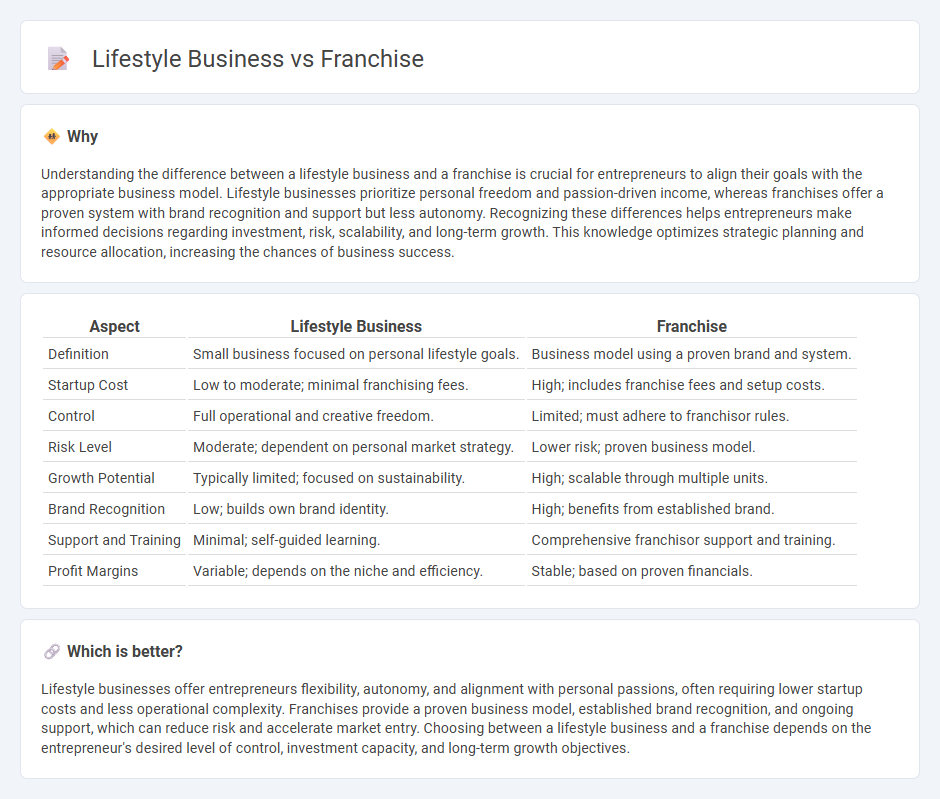
Lifestyle businesses prioritize personal fulfillment and flexible work hours, often focusing on niche markets with low startup costs and limited scalability. Franchises offer a proven business model with brand recognition, standardized operations, and support systems, requiring higher initial investment but providing greater growth potential and risk mitigation. Explore the key differences to determine which path aligns best with your entrepreneurial goals.
Why it is important
Understanding the difference between a lifestyle business and a franchise is crucial for entrepreneurs to align their goals with the appropriate business model. Lifestyle businesses prioritize personal freedom and passion-driven income, whereas franchises offer a proven system with brand recognition and support but less autonomy. Recognizing these differences helps entrepreneurs make informed decisions regarding investment, risk, scalability, and long-term growth. This knowledge optimizes strategic planning and resource allocation, increasing the chances of business success.
Comparison Table
| Aspect | Lifestyle Business | Franchise |
|---|---|---|
| Definition | Small business focused on personal lifestyle goals. | Business model using a proven brand and system. |
| Startup Cost | Low to moderate; minimal franchising fees. | High; includes franchise fees and setup costs. |
| Control | Full operational and creative freedom. | Limited; must adhere to franchisor rules. |
| Risk Level | Moderate; dependent on personal market strategy. | Lower risk; proven business model. |
| Growth Potential | Typically limited; focused on sustainability. | High; scalable through multiple units. |
| Brand Recognition | Low; builds own brand identity. | High; benefits from established brand. |
| Support and Training | Minimal; self-guided learning. | Comprehensive franchisor support and training. |
| Profit Margins | Variable; depends on the niche and efficiency. | Stable; based on proven financials. |
Which is better?
Lifestyle businesses offer entrepreneurs flexibility, autonomy, and alignment with personal passions, often requiring lower startup costs and less operational complexity. Franchises provide a proven business model, established brand recognition, and ongoing support, which can reduce risk and accelerate market entry. Choosing between a lifestyle business and a franchise depends on the entrepreneur's desired level of control, investment capacity, and long-term growth objectives.
Connection
Lifestyle businesses and franchises are connected through their shared focus on consistent revenue and operational frameworks that support sustainable income. Franchises offer entrepreneurs a proven business model and brand recognition, enabling them to maintain work-life balance characteristic of lifestyle businesses. Both models emphasize stability and scalability, aligning entrepreneurial goals with personal lifestyles and long-term financial security.
Key Terms
Ownership Structure
Franchise businesses operate under a proven ownership structure where the franchisor grants the franchisee rights to use brand, systems, and support, ensuring consistent quality and shared brand reputation. Lifestyle businesses typically feature independent ownership allowing the entrepreneur full control over operations, decision-making, and brand identity, often prioritizing personal passion and work-life balance over scalability. Explore deeper insights on how ownership structures impact growth and investment opportunities.
Growth Potential
Franchise businesses offer scalable growth potential through established brand recognition, proven business models, and support systems, enabling faster market expansion compared to lifestyle businesses, which prioritize personal satisfaction and work-life balance over rapid growth. Franchise models benefit from economies of scale and franchisee motivation to increase profitability, whereas lifestyle businesses often maintain steady but limited revenue streams tailored to individual goals. Explore the nuances of each business type to determine which growth strategy aligns best with your entrepreneurial vision.
Operational Control
Franchise businesses offer structured operational control with established systems, training, and support that ensure consistency across locations. Lifestyle businesses provide owners with full operational control, allowing flexibility to adapt business practices and maintain personal work-life balance. Explore how operational control impacts scalability and daily management to choose the best fit for your goals.
Source and External Links
A Consumer's Guide to Buying a Franchise - A franchise is a business format where the franchisee pays fees to operate under the franchisor's established system and brand, receiving training, support, and ongoing royalties in exchange.
Franchising - Wikipedia - Franchising is a business expansion strategy where a franchisor licenses its business model, brand, and intellectual property to a franchisee, who operates independently but within contractual obligations.
What is a Franchise - International Franchise Association - Franchising involves a licensing relationship where franchisors grant franchisees the right to sell products or services using the franchisor's brand and system, including training, support, and operational guidelines.
 dowidth.com
dowidth.com